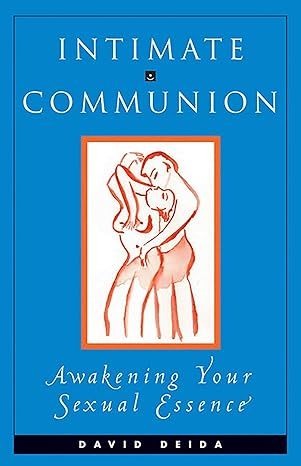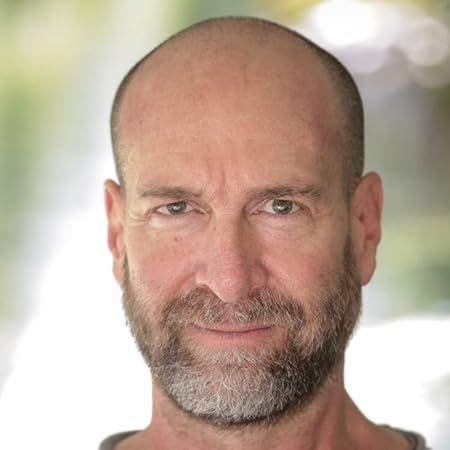Intimate Communion: Awakening Your Sexual Essence
4.6
-
445 ratings
To truly understand your intimate relationships, you must read this book! David Deida, internationally known for his work in personal growth and intimate relationships, shares the deep understandings and effective techniques that he has refined through his 20 years of consultation, research and spiritual practice. Learn how to keep your relationships growing--beyond the sexually neutralized roles so typical of today--and create a relationship that is spiritually erotic, sexually deep and passionately committed to love.
Kindle
$12.99
Available instantly
Audiobook
$0.00
with membership trial
Paperback
$14.39
Audio CD
$27.29
Ships from
Amazon.com
Payment
Secure transaction
ISBN-10
155874374X
ISBN-13
978-1558743748
Print length
270 pages
Language
English
Publisher
Health Communications Inc
Publication date
October 31, 1995
Dimensions
5.5 x 0.7 x 8.5 inches
Item weight
10.4 ounces
Product details
ASIN :
B001C34ZXC
File size :
837 KB
Text-to-speech :
Enabled
Screen reader :
Supported
Enhanced typesetting :
Enabled
X-Ray :
Enabled
Word wise :
Enabled
Editorial Reviews
About the Author
Acknowledged as one of the most insightful and provocative teachers of our time, bestselling author David Deida continues to revolutionize the way that men and women grow spiritually and sexually. His ten books are published in more than twenty-five languages worldwide and are required reading in university, church, and spiritual center courses. His workshops on a radically practical spirituality have been hailed as among the most original and authentic contributions to the field of self-development currently available. Deida is included in The Watkins Review Spiritual 100 List, designating the most spiritually influential people worldwide. He is a founding member of Integral Institute, and has taught and conducted research at the University of California-San Diego School of Medicine, University of California-Santa Cruz, San Jose State University, Lexington Institute in Boston, and Ecole Polytechnique in Paris, France. Some of his recent books include Blue Truth, The Enlightened Sex Manual, and the 20th Anniversary Edition of the international bestseller, The Way of the Superior Man.
Sample
Excerpt. © Reprinted by permission. All rights reserved.
Chapter 2
THE THREE WAYS OF ôLOVEö
ôI love you, son.ö
ôLook at that young couple, they are so in love.ö
ôMy God, how badly I want to make love with you.ö
In our culture, we have a tendency to use the word ôloveö for three very different feelings. We can begin to understand some of the complexities of our intimate life when we untangle these three different threads of our loving. The practice of Intimate Communion depends on a clear understanding of these three separate elements in an intimate relationship: love, romance and polarity.
Love
Of the three—love, romance and polarity—love is the simplest to understand and the most difficult to practice. Love is simply what is when your heart is open.
You could love your husband, your dog, your mother, your car, a book, your child, a painting or the seashore—or all of them at once. Love is simply the opening of your heart. When your heart is open, you love whomever, or whatever, is in your life. Love is the union of you and the one you are with.
Love is what is when your heart is open. To do love is to open your heart. If you are waiting to feel love, as if love will come to you, you may be waiting for a long time. Love happens whenever your heart opens, whether 10 years from now or right now, in this very moment.
Love has nothing to do, necessarily, with sex. You can love someone and not have sexual desire for them. You can want to have sex with someone you donÆt even know, or someone you are not loving. You exist as love when your heart is unguarded and opened, and you close yourself off to love when you guard your heart.
You can actually learn to love. You can learn how to open your heart, even when circumstances are difficult. Even when your relationship is painful, even when you feel hurt, you can practice opening your heart. You can practice love. This is the foundation of Intimate Communion: to practice opening your heart in every moment, including when you feel hurt. Rather than turn away or close down, you can practice loving. This practice of love extends far beyond conventional therapy.
There are many good books about how our intimate relationships often replicate our relationships with our parents. There are many good therapists who know how to work with childhood issues that come up in our intimacies. And when we work with a therapist, we often begin by examining our past, our parents, our childhood.
Our childhood stuff seems endless, once we begin to dig. A little digging is good, in order that we understand the roots of our search for love and its resulting frustration. But after a little digging, it is time to release the past and practice intimacy right now, in the present. Rather than concerning ourselves with the past cause of our present unhappiness, we can instead practice opening our hearts, right now. And through this moment to moment practice of open-hearted intimacy, this practice of being love, the power of the past weakens.
When you fall and wound your knee, it hurts. ItÆs good to take a few moments, inspect the wound, clean it and put a bandage on it. Without doing much else, it will heal. Unless, of course, you keep falling on your knee and re-wounding it.
In the same way, your childhood wounds will heal on their own, as long as you donÆt repeat the old pattern of wounding yourself over and over again. It is much better to practice true intimacy now than it is to continually focus on the past, just as it is much better to learn how to walk without falling rather than it is to focus on your wounded knee.
Eventually, through this practice of loving, our old childhood patterns of turning away or closing down when we feel hurt, or punishing our partner for hurting us, dissolve. We may still feel hurt when our partner acts unlovingly, but our hurt does not become closure. Our pain does not create distance in our relationship. Likewise, when we act unlovingly toward our partner, he or she can practice love, rather than striking back, closing down or becoming distant.
Romance
Imagine that you are at a party and you meet a person of the opposite sex. The two of you begin a conversation and the rapport is instant. The talk seems effortless. You really enjoy being with this person and you feel really comfortable. In fact, the familiarity is startling. You look at this person and say, ôItÆs hard to believe that we just met a few minutes ago. I feel like IÆve known you for a long time. Maybe we knew each other in a past life or something!ö
Have you finally met ôthe one,ö the mate you have always been hoping to find? You leave the party thinking about this person. You feel happy, maybe even a bit giddy inside. The two of you begin seeing each other, spending more and more time together. You feel the specialness of the relationship. There is a sense of uniqueness and destiny; you feel that it was meant to be.
This is romantic attraction, infatuation, ôfalling in love.ö
Romantic attraction begins with a strong feeling of oneness and of bonding, a feeling that you have ôalways known each other.ö You have probably felt this way about some person at some point in your life. If you have, you know that the feeling doesnÆt last. After several months, or, if you are lucky, several years, the feeling of romantic attraction wears off.
And when it does, it always seems to turn into something very specific. This person who was once so magical to you, this one who seemed to be the one who was going to give you everything you ever wanted, who was going to bring unending love into your life once and for all, seems to turn into precisely the person who does not give you what you want.
Eventually, relationships based on romantic attraction always result in not getting the love you want. Why? Because romantic attraction is based on an imprint in our psyche that formed during our childhood. As many of us have already discovered through therapy or personal reflection, those people to whom we are romantically attracted are exactly those people who embody the qualities, good and bad, of our parents. Whatever our parents didnÆt give us enough of (love, attention, praise, freedom, etc.), is exactly the thing we will not get from our romantically chosen partner.
It seems like we ôalways knewö our romantic partner because we did know him or her: in the familiar texture of our parents, imprinted in our childhood psyche! Our new partner seems so special because we unconsciously hope to continue the relationship we had with our parents and finally get the love we always wanted, the acceptance we always desired, the fulfillment of our heart that we always craved. And, because we have unconsciously chosen our parents in our partner, we have chosen someone who will not give us what we always wanted, in exactly the same way that our parents didnÆt. (Even if our romantic partner does give us what we want, we often cannot receive it, because our childhood imprint doesnÆt believe it is real.)
As the thrill of being ôin loveö wears off, your romantically-chosen partner seems to be perfectly suited to cause you pain. He or she seems to have an uncanny ability to poke at your weak spots and hurt you, though not necessarily on purpose; the person who used to bring out the best in you now seems to bring out the worst, just by being himself or herself. And you do the same for your partner. Because romantic attraction is based on qualities in your partner that you unconsciously recognize from your childhood experiences, you will be as fulfilled and as unfulfilled by your partnerÆs love as you were by your parentsÆ.
Sexual Polarity
The subtle power of sexual polarity pervades all our lives. It draws us toward our lover. It makes us uncomfortable with our spouseÆs best friend. It keeps a marriage full of life, and when it is gone, it takes the life with it. What is sexual polarity?
You are standing in the supermarket choosing tomatoes. You look up, straight into a very attractive strangerÆs eyes, a stranger of the opposite sex. A jolt of electricity runs through you. Your eyes remain engaged a little longer, and then you look down at the tomatoes. Your body is flush with energy and aliveness.
Sexual polarity—the magnetic pull or repulsion between the Masculine and Feminine—affects all our lives. A few moments of sexual polarity can cause the memory of your trip to the supermarket to linger in your mind for hours or even days. Total strangers can raise your body temperature, cause your face to blush and make your heart pound. On the other hand, when sexual polarity is weak in our intimate relationships, we begin to feel that something is missing, and we often blame our partners or ourselves.
Sexual polarity either is or isnÆt happening—or so it seems at first. Before we understand that sexual polarity can be consciously turned on or off, we call it ôchemistry.ö It seems that either your intimate relationship has it or it doesnÆt. In todayÆs modern ideal of a relationship based on friendship, we sometimes act as if sexual polarity is not as important as, say, good communication. So, over time, our intimate relationships tend to become more talk and less action.
However, whether we like to admit it or not, talk is not enough for many of us. We also want to share the energetic juice of sexual polarity with our intimate partner.
So, in the practice of Intimate Communion, we learn to consciously practice the art of cultivating and sharing sexual polarity. We face the fact that for most of us, the force of polarity is at the core of our sexual attraction in intimacy. This mysterious force affects all our lives, yet remains mostly at an unconscious level.
We begin to master sexual polarity by becoming sensitive to its flow in everyday life. Imagine you are in a room talking with your good friends who are the same sex as you. The conversation is flowing effortlessly. You are laughing together and listening together. The mood is free and easy.
Suddenly, an extremely attractive person of the opposite sex walks into the room. The energy shifts. The conversation halts for a moment and then begins again, a bit more choppy, a bit contrived. You feel slightly self-conscious. And you are aware of him or her, the attractive one whose mere presence in the room has shifted the energy. This is the force of sexual polarity.
We are affected by sexual polarity from head to toe. Our minds become simple in the midst of a loving embrace and our thoughts are triggered to race by the inviting eyes of a stranger. Our heartbeat, skin temperature and posture are also affected by sexual polarity. Notice the shifts in your body the next time you are standing face to face with a highly interesting other. Merely imagining his or her eyes lingering on your body causes a shift in blood flow, breathing and muscle tone.
INTIMATE COMMUNION IS NOT ABOUT ROMANCE
To prepare for the practice of Intimate Communion, we must understand that love, romance and sexual polarity are not the same. You can love anyone. You can love everyone. You can love a mountain or a flower, a painting or a stuffed animal. Love is simply when you open your heart. In love, you allow yourself to relax your sense of separation, so that you become one with whomever or whatever you are contemplating, whether a child, a lover or the Grand Canyon. Love is unity, openness to the point of oneness, ultimately. And there is no limit to the number of people, things or places you can love.
Romance is an exclusive feeling. The main feeling in romantic infatuation is, ôFinally, here is the person I have been waiting for all my life.ö You feel a deep sense of familiarity with this special person. Most people only feel this way with one person, or maybe several people throughout their lives. Whereas love is the action of opening your heart, romance is the less-common feeling of familiarity and ôat-homenessö you feel with the special person in your life. And, inevitably, while loving only increases loving, romance often ends in disappointment when your special partner begins to irritate you or frustrate your desire for love more than anyone else in your life.
Sexual polarity is an arc of energy that flows between two people. It could happen in the grocery store with a person you donÆt even know, let alone love. It is a flow of energy that runs through your body, mind and emotions, and you might experience it many times a day—at work, on the street or at home.
There are two main threads to the practice of Intimate Communion. The most important one is the practice of love itself: the conscious practice of opening our hearts and feeling through our obstructions to loving in every moment. The secondary practice is the conscious and artful use of the force of sexual polarity in the transmission of love. In the practice of Intimate Communion, the sex act itself can become a spiritual union, a communication of the force of life and love, a passionate transmission of openness and ecstasy. Whether sexual polarity is practiced or not, Intimate Communion is about relaxing more and more into perfect coincidence with love, surrendering our fears and resistances. To be freely open even in the midst of fear involves a moment-to-moment discipline of loving. To be free and loving is the ultimate discipline—and this is the practice of Intimate Communion.
1995 David Deida. All rights reserved. Reprinted from Intimate Communion by David Deida. No part of this publication may be reproduced, stored in a retrieval system or transmitted in any form or by any means, without the written permission of the publisher. Publisher: Health Communications, Inc., 3201 SW 15th Street, Deerfield Beach, FL 33442.
Read more
About the authors
David Deida
Acknowledged as one of the most insightful and provocative teachers of our time, bestselling author David Deida continues to revolutionize the way that men and women grow spiritually and sexually. His ten books are published in more than twenty-five languages worldwide and are required reading in university, church, and spiritual center courses. His workshops on a radically practical spirituality have been hailed as among the most original and authentic contributions to the field of self-development currently available. Deida is included in the Watkins Review Spiritual 100 List, designating the most spiritually influential people worldwide. He is a founding member of Integral Institute, and has taught and conducted research at the University of California-San Diego School of Medicine, University of California-Santa Cruz, San Jose State University, Lexington Institute in Boston, and Ecole Polytechnique in Paris, France. Some of his recent books include Blue Truth, The Enlightened Sex Manual, and the 20th Anniversary Edition of the international bestseller, The Way of the Superior Man.
Read more
Reviews
Customer reviews
4.6 out of 5
445 global ratings
Amazon Customer
5
Paradigm Changing!
Reviewed in the United States on January 6, 2017
Verified Purchase
This book has helped me go deeper into acceptance of who I am and what I want in a relationship. I feel validated in a powerful way. Reading this has also shed some major light on past relationship experiences and has helped me become more at peace with my past and future. I can give myself permission to let go, to surrender into love and trust with myself in new ways. I recommend this book to any spiritually identified people, as well as anyone looking for true fulfillment in their relationships. David holds nothing back and I'd love to see more of this in relationship books.
Read more
6 people found this helpful
JCS
5
Why didn't I already know all this??
Reviewed in the United States on May 13, 2010
Verified Purchase
The ideas in this book are as basic as they are ground-breaking. Reading it, I had so many past situations flash before my eyes and explode in complete understanding. If I had only known! How obvious! The book is not one that will teach us to "communicate" or "manage conflicts". It enlightens you on the underpinnings of our masculine and feminine natures and you understand why things are happening. While there is no road map to solving problems, if you understand why, you are 90% there. It amazes me how many of my past relationships and skirmishes fit so easily into the context of masculine/feminine. I understand myself better and that leads to acceptance. I understand HER better and that leads to acceptance and some pretty simple ways to repair. I wish every child learned these concepts. How much happier we'd all be. How much less confused by the opposite sex. How much more appreciative of the opposite sex.
Consider also reading "Getting To I Do" by Pat Allen. Hers is a more concrete "how to" book, but it addresses most of the same issues and in a much different way. It will round out the theories.
Read more
12 people found this helpful
A'ra Blair
5
From the Author of Communing With the Infinite
Reviewed in the United States on July 16, 2011
Verified Purchase
This was the first book on relationships that really helped me understand my intrinsic qualities for showing up in an intimate relationship. I've always thought my natural tendency was as the more masculine. But practical applications for really getting in touch with my full expression and high truth helped me see the feminine qualities that I'd been denying for fear of being discounted or oppressed. I've read this book again and again because of it's insightful content. If you'd like to experience a deeper understanding of your authenticity and how you show up in relationship, this book is for you. I highly recommend it as a source for experiencing your ultimate expression in relationships with yourself and your beloved.
Read more
LeAnn Martin
5
Makes Life Make Sense!
Reviewed in the United States on July 18, 2023
Verified Purchase
I really liked this book because it really brought things together for me - It gave me understandings that I could translate into improving my relationships! His idea of Open Love hit me as valuable in so many ways. I finally now know how I can love someone after they hurt me. That I don't need to hide away or push away or punish them. That way I can know someone special might hurt me (accidentally or on purpose) and I can still love them while knowing they are exhibiting a more Closed Love. That makes me understand more and be less angry at the behaviors. I liked his describing the three ways to relate to a partner: Co-dependent, 50-50 and with open love. It also was valuable to read about his idea that masculine energy seeks primarily freedom while feminine wants love. A lot of what he said is very relevant in today's world in handling masculine and feminine approaches. This is a valuable book!
Read more
Kindle Customer
5
The defining book on relationships & sexual chemistry
Reviewed in the United States on March 15, 2018
Verified Purchase
If you ever wondered why some of your romantic/sexual relationships failed, you need to read this book. You might misinterpret this as Male & Female stereotypes....it's NOT. It's about sparking sexual polarity between a masculine essence and a feminine essence. I've seen this book transform my own relationships for the better and many many others that went from struggling in their relationships to turning them around!
Deida's 1st book is arguably his best of all time.
Read more
11 people found this helpful
Top David Deida titles
View all
Dear Lover: A Woman's Guide To Men, Sex, And Love's Deepest Bliss
4.4
-
959
$0.99
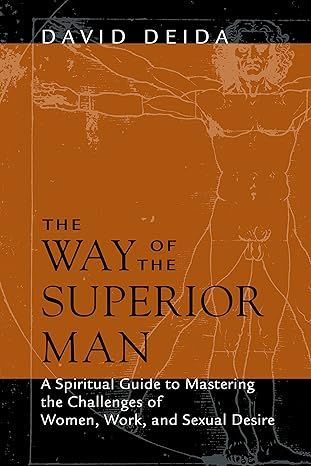
The Way of the Superior Man: A Spiritual Guide to Mastering the Challenges of Women, Work, and Sexual Desire
4.6
-
3,730
$12.18
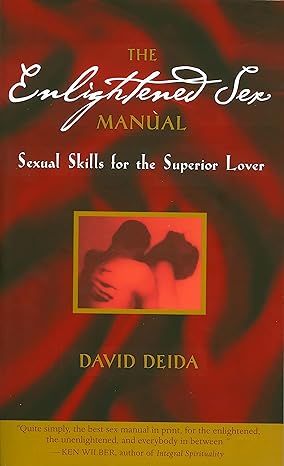
Enlightened Sex Manual
4.5
-
644
$12.99
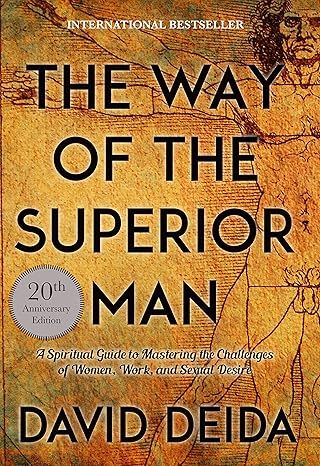
The Way of the Superior Man: A Spiritual Guide to Mastering the Challenges of Women, Work, and Sexual Desire (20th Anniversary Edition)
4.7
-
13,919
$0.99
Best Sellers
View all
The Tuscan Child
4.2
-
100,022
$8.39

The Thursday Murder Club: A Novel (A Thursday Murder Club Mystery)
4.3
-
155,575
$6.33

Sapiens: A Brief History of Humankind
4.6
-
140,302
$13.49

The Butterfly Garden (The Collector, 1)
4.3
-
88,556
$9.59

Things We Hide from the Light (Knockemout Series, 2)
4.4
-
94,890
$11.66

The Last Thing He Told Me: A Novel
4.3
-
154,085
$2.99

The Perfect Marriage: A Completely Gripping Psychological Suspense
4.3
-
143,196
$9.47

The Coworker
4.1
-
80,003
$13.48

First Lie Wins: A Novel (Random House Large Print)
4.3
-
54,062
$14.99

Mile High (Windy City Series Book 1)
4.4
-
59,745
$16.19

Layla
4.2
-
107,613
$8.99

The Locked Door
4.4
-
94,673
$8.53
